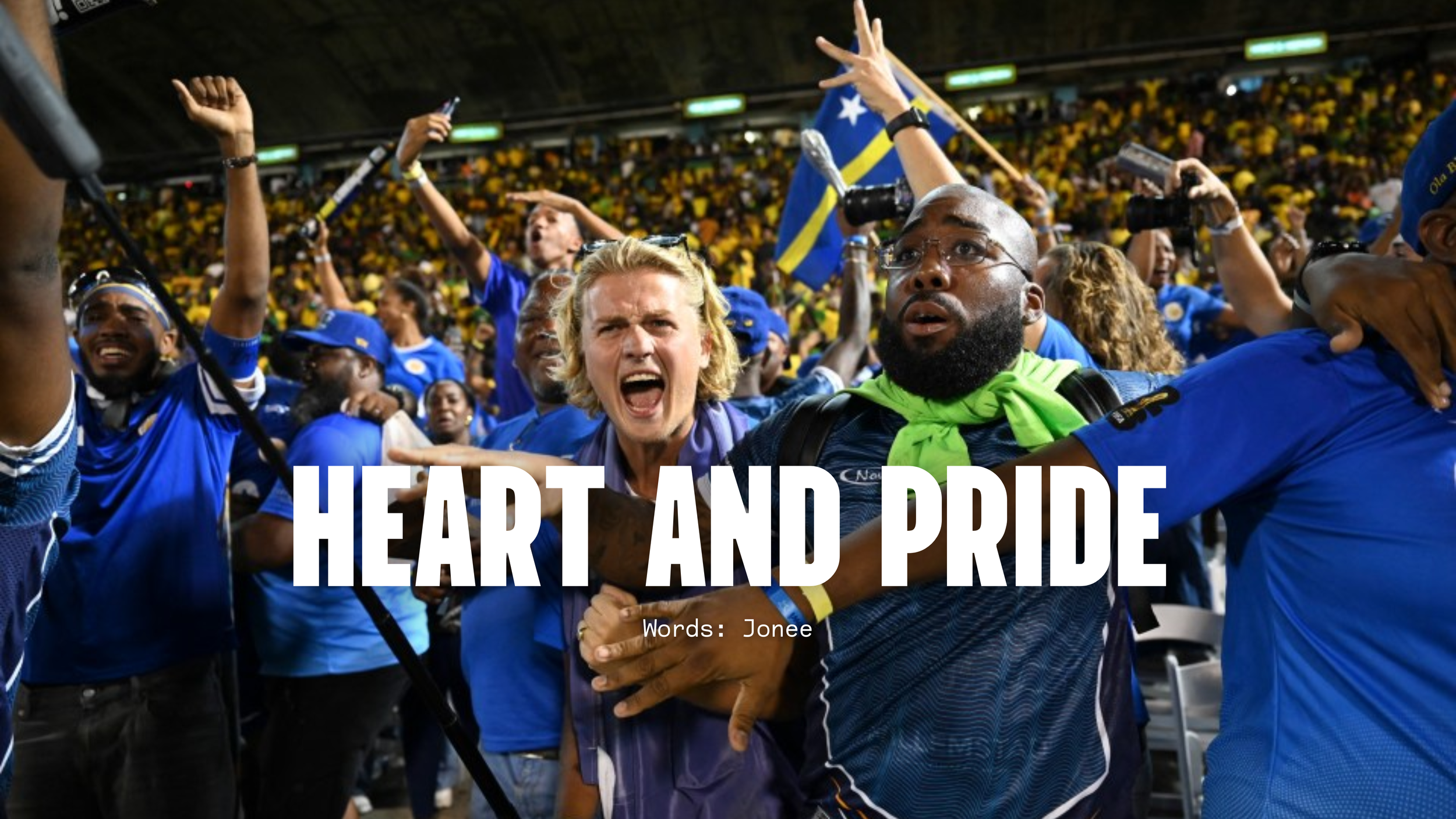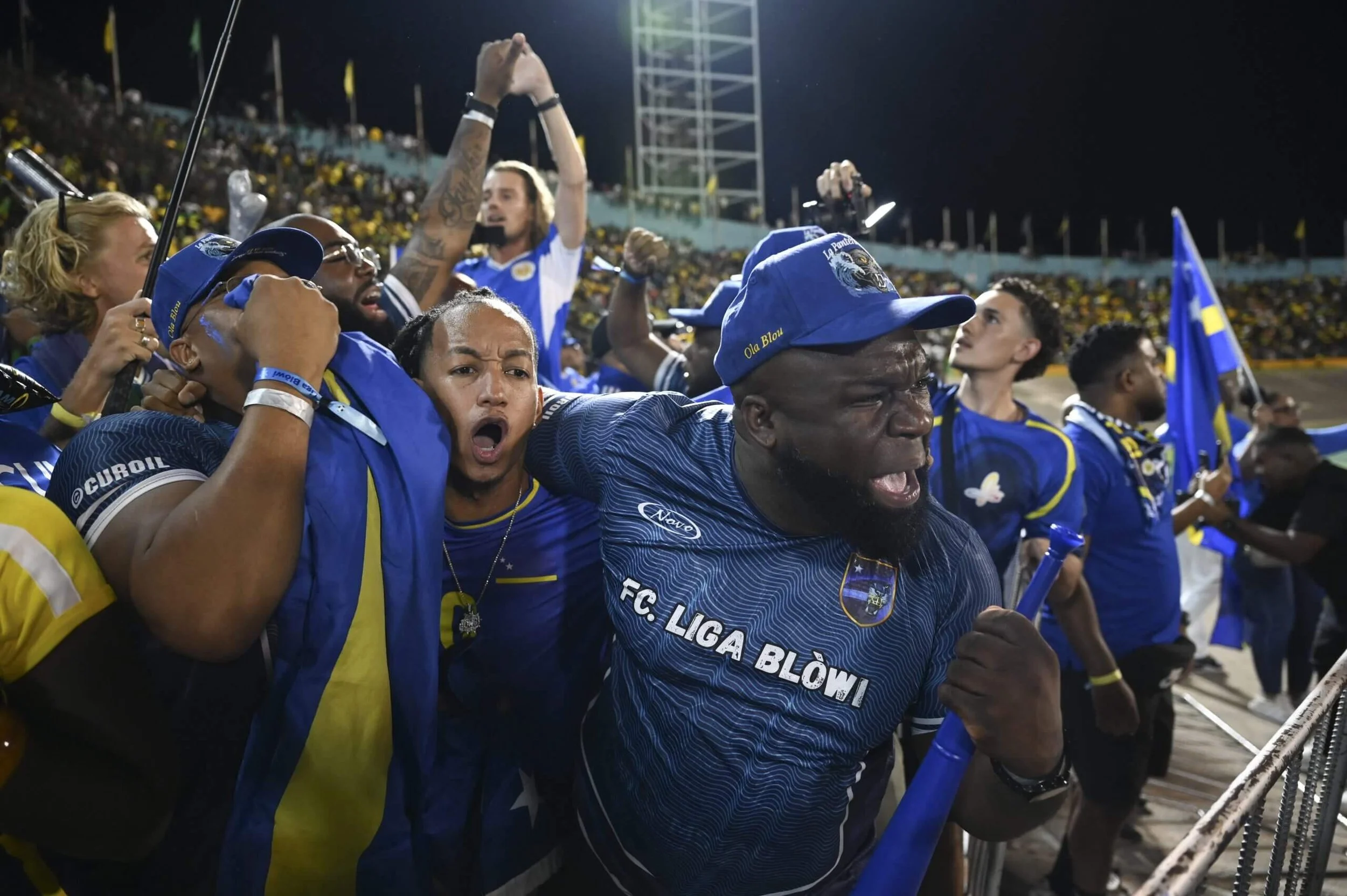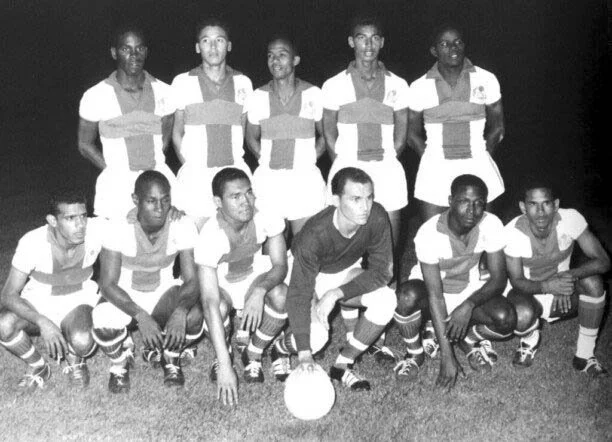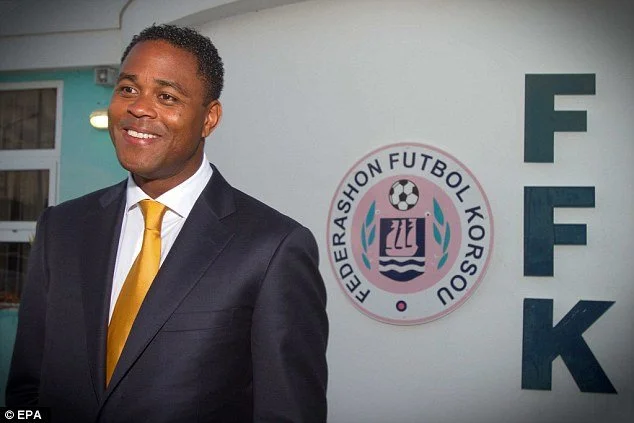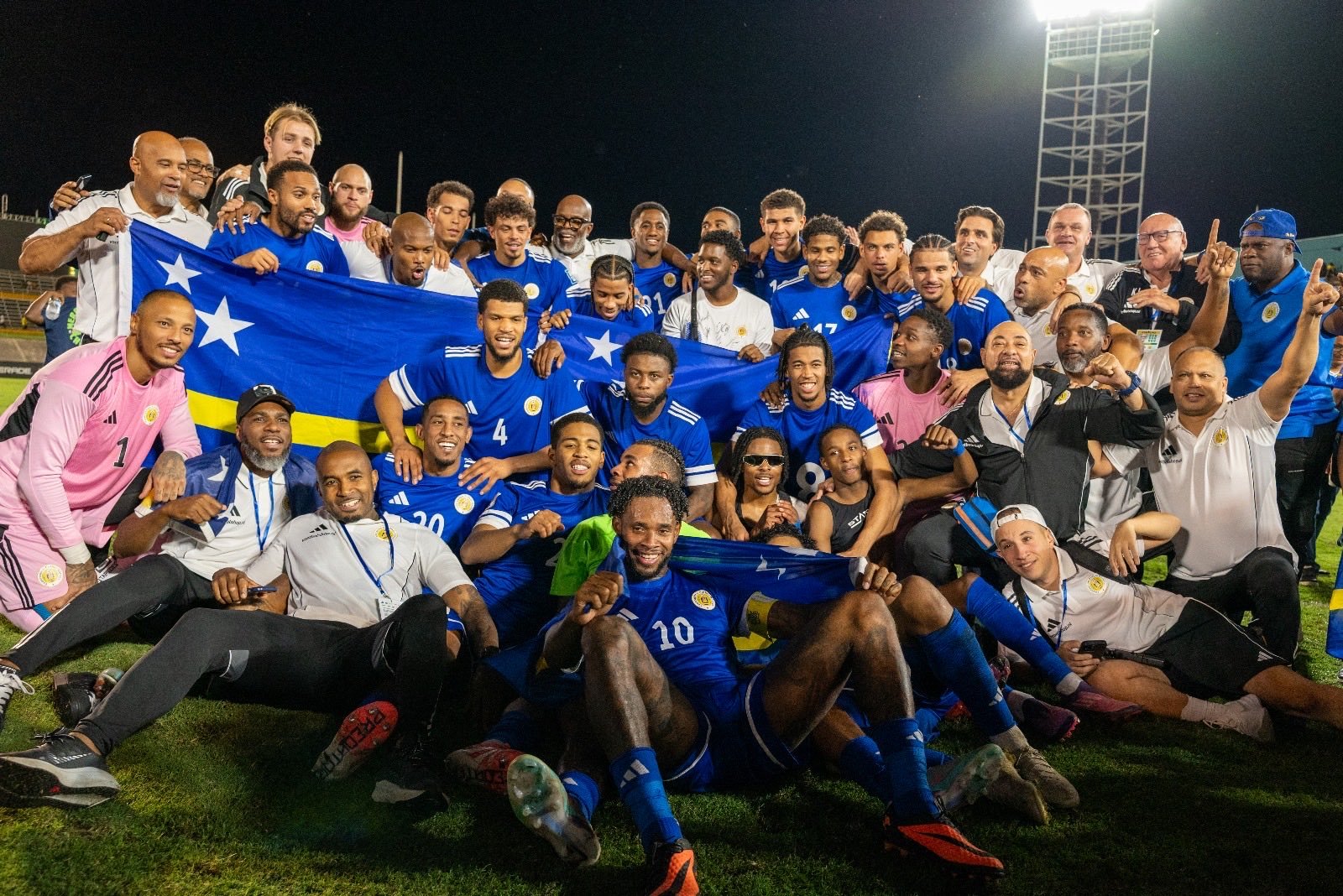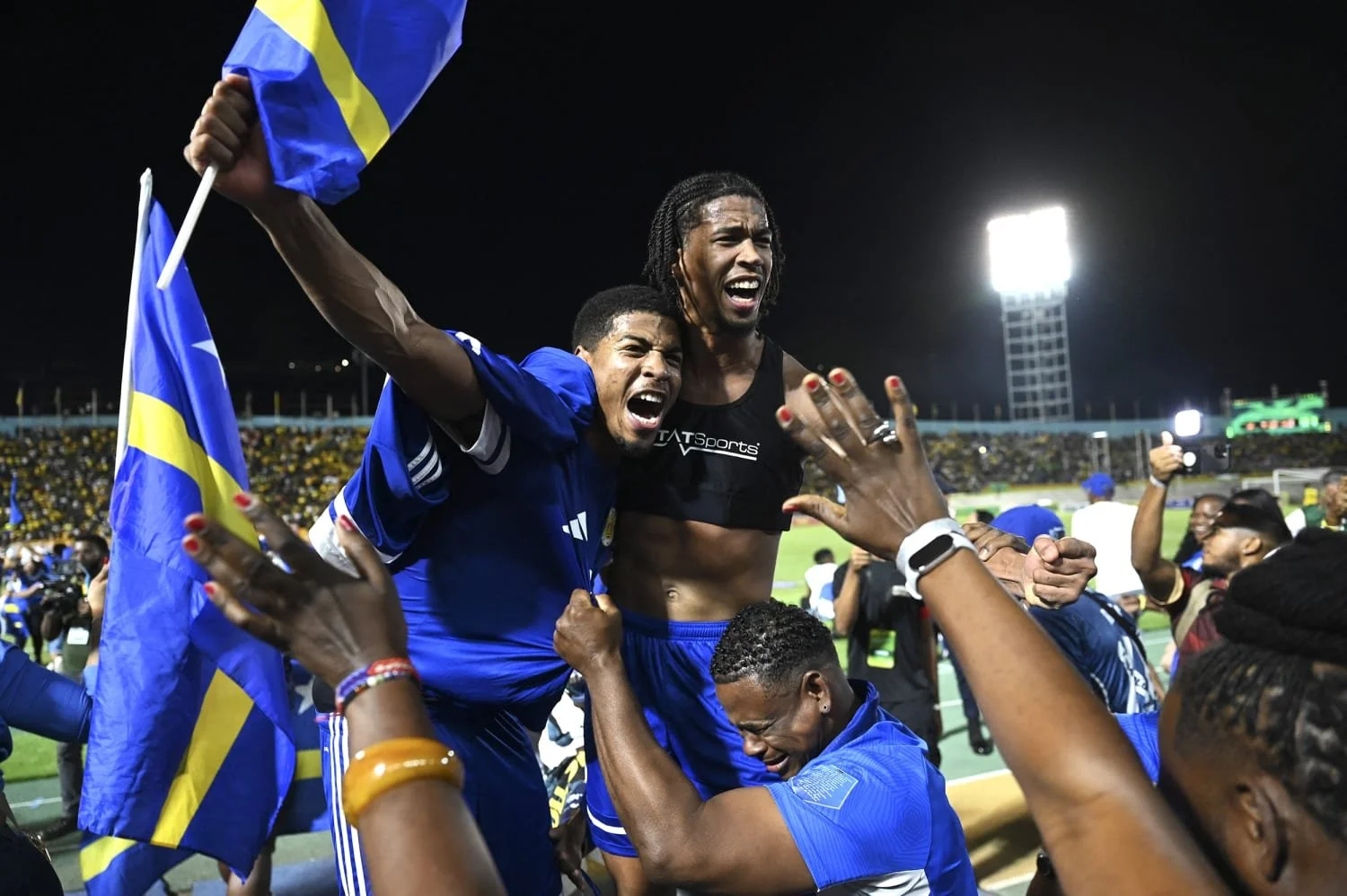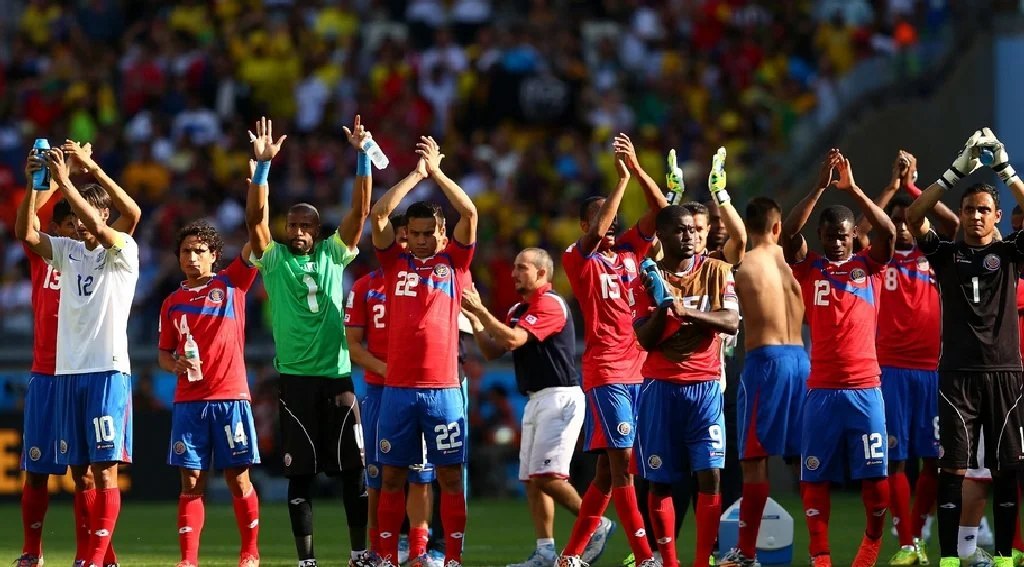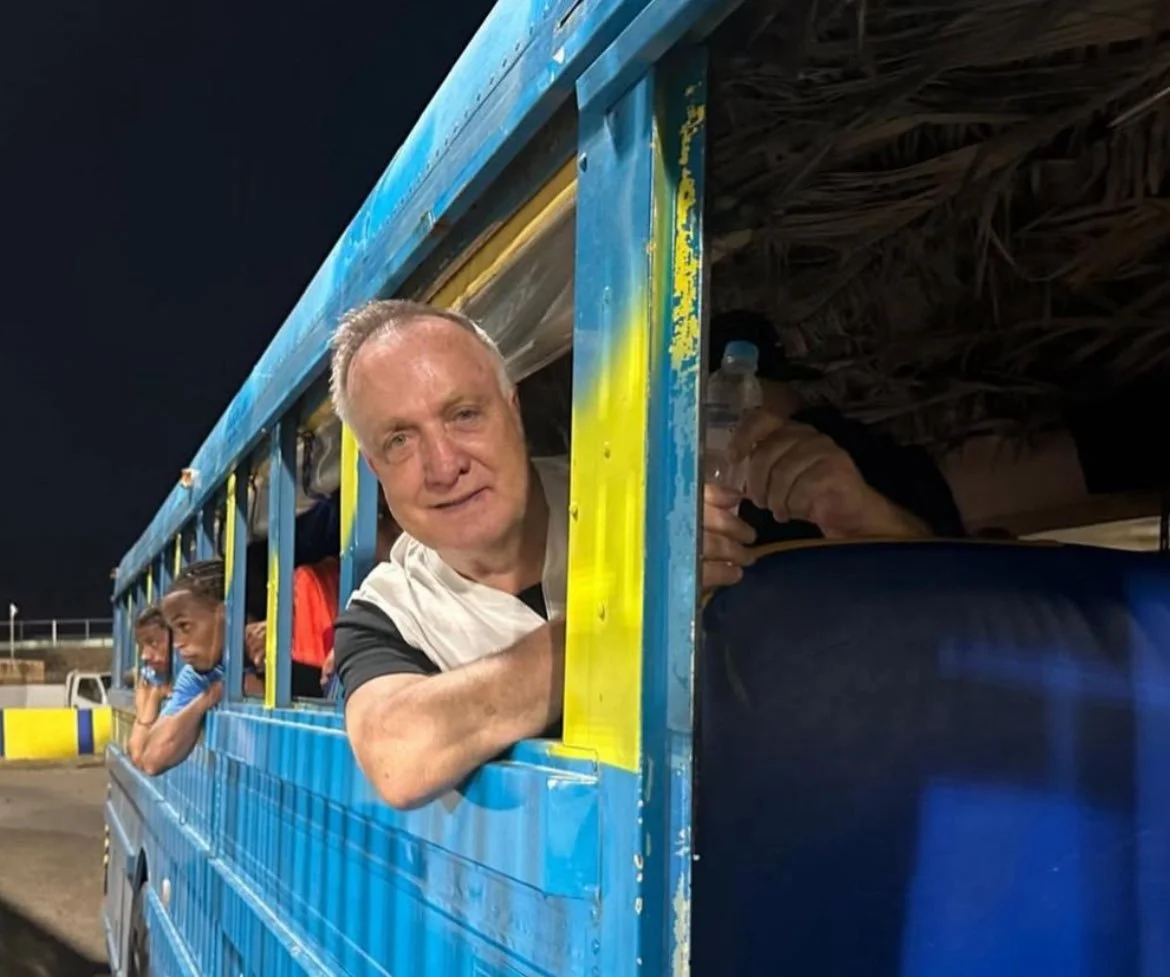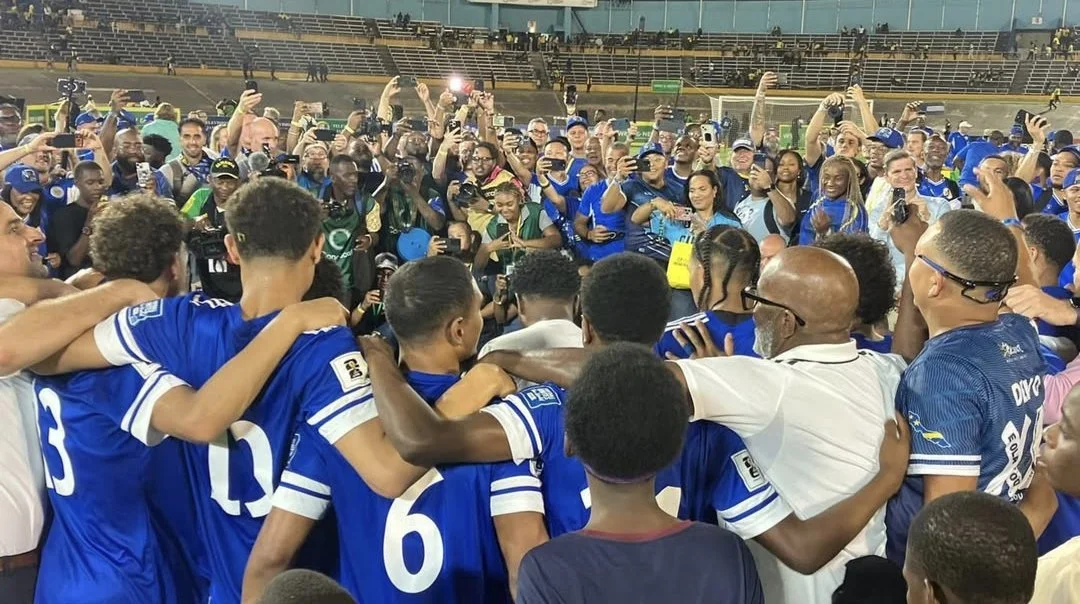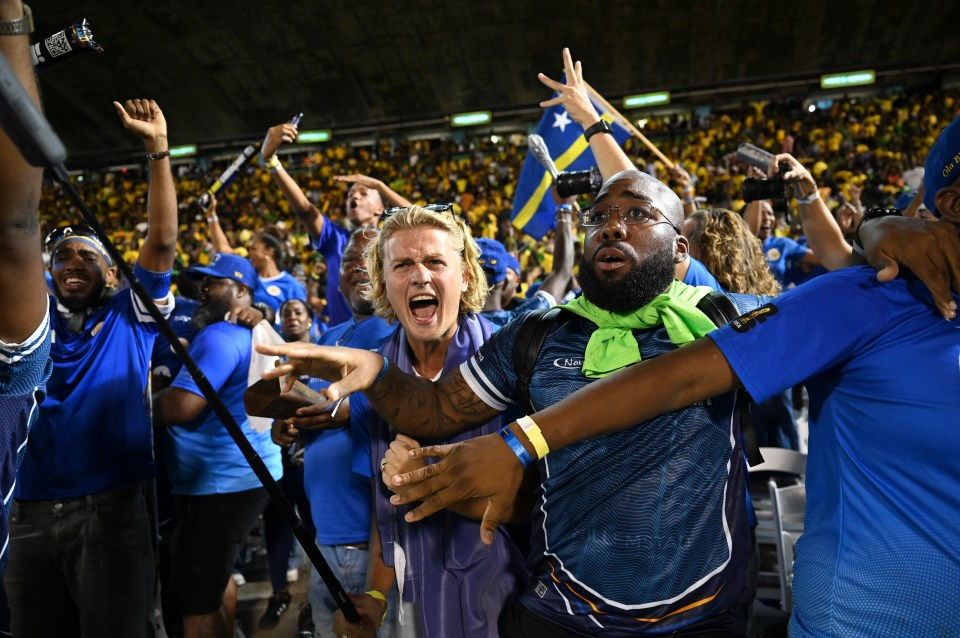
Words by Jonee | Published 21.11.2025There are nights in football that feel larger than the sport itself.
Nights that become stories told over generations, woven into the cultural memory of a people, shaping identity and belonging long after the stadium lights fade.
For Curaçao, one such night arrived in Kingston, Jamaica earlier this week, when a small island nation — a speck of land in the Caribbean Sea — stood firm against one of the region’s giants, absorbed wave after wave of pressure, and clinched a goalless draw that felt, to anyone watching, like the exhale of a dream that had taken years to build. When the final whistle came, Curaçao was no longer merely a rising football nation. It was a World Cup team — the smallest country ever, by population, to reach football’s grandest stage.
Thousands of miles away, in Willemstad, fireworks exploded above the harbour. The Queen Emma Bridge shook with the footsteps of fans dancing and screaming into the humid night. Children waved jerseys too big for their frames. Strangers embraced as though they had known each other their entire lives. In those hours, Curaçao was not just celebrating a sporting achievement; it was celebrating the creation of a new heritage.
But football fairytales do not simply occur overnight. They are sculpted and fought for. They rise from history, culture, tragedy, unity, and relentless belief.
Curaçao supporters celebrate following their World Cup qualification in November, 2025.
Photo Credit: Getty ImagesWhen the Netherlands Antilles dissolved in 2010, the Caribbean’s political map shifted, but the footballing map shifted even more. The old Netherlands Antilles team had been patchwork — multiple islands represented under one flag, infrastructure stretched across geography, and identity often muddled by administrative challenges. With the political end of the union, the football team ceased to exist. Curaçao inherited its footballing membership and records, but not its clarity. It had to begin again, with a federation that suddenly possessed the freedom to define its own destiny — and the burden of creating everything from scratch.
The early years were fragile. The local league was underfunded and inconsistently attended. Youth academies were scattered and uneven. Facilities lagged far behind global standards. Even training gear and travel arrangements sometimes felt improvised. Curaçaoan football existed more in passion than in structure, kept alive by families, communities, and players who loved the sport despite the system surrounding it.
But beneath the surface, something else existed: a profound sense of identity that had never fully been expressed in football terms. Curaçao, as an island, possesses a unique cultural richness — a blend of Caribbean spirit, Dutch influence, African heritage, and a multilingual vibrancy that flows through everything from food to music to language.
Football, for decades, had failed to tap into that deep well. The dissolution of the Netherlands Antilles, while politically significant, also served as an opportunity to build something distinctly Curaçaoan, something fully rooted in the island’s own culture rather than a shared regional banner.
The Netherlands Antilles National Team, 1950. The country dissolved in 2010, along with the national team.
Photo Credit: Outside WriteThe Curaçao Football Federation recognized that if the team was to succeed, it could not rely solely on the talent produced within its borders. The island’s population was too small, and its infrastructure too young, to sustain a competitive national program on its own. But Curaçao had something that changed everything: a diaspora — thousands of Curaçaoan families who, over decades, had emigrated to the Netherlands, raising children who grew up in one of the world’s most sophisticated football ecosystems. These children, now adults playing in Dutch academies or European leagues, carried Curaçaoan blood, Curaçaoan names, Curaçaoan families — and a connection waiting to be rekindled.
The task was to convince them.
In 2015, the federation made a bold appointment: Patrick Kluivert, one of the most iconic strikers in Dutch history, and the son of a Curaçaoan father. His arrival created an immediate spark. Kluivert represented both worlds — the elite Dutch football culture and the Caribbean roots that shaped him. He brought professionalism, charisma, and credibility. But more importantly, he brought a message to Curaçaoan-Dutch players abroad: you belong to this island, and this island belongs to you.
Recruitment shifted to a strategy of active engagement with the Curaçaoan diaspora. Phone calls were made. Meetings were arranged. Families were visited. Young men who had grown up hearing stories about Curaçao from parents or grandparents suddenly felt a pull toward a flag they had never played under.
Kluivert’s tenure was only the opening act, but it set a tone: Curaçao was serious.
Patrick Kluivert in his role with the Curaçaoan Football Association.
Photo Credit: EPAWhen he left and Remko Bicentini stepped in, continuity was preserved. Bicentini understood Curaçao on a deeper emotional level. He was not a superstar name, but he was a builder. Under his guidance, Curaçao transitioned from a team discovering itself to a team defining itself. Structures were established: video analysis rooms, tactical briefings, scouting networks, fitness regimens resembling those of top European clubs. Players arriving from the Netherlands no longer felt like they were stepping down — they felt like they were stepping into something meaningful.
Slowly, through rigorous training, a footballing identity began to form, one that mirrored the island itself: small but fearless, disciplined but expressive, orderly yet alive.
It was around this time that the golden generation began to assemble.
Names like Leandro and Juninho Bacuna, proficient and versatile midfielders, returned to the island of their parents. Cuco Martina, a defender with Premier League experience, brought leadership and calm. Eloy Room, a goalkeeper with nerves of steel, brought reliability at the highest level. Vurnon Anita brought European pedigree. Rangelo Janga brought power and finishing. From Europe came technique. From the Caribbean came spirit. And in between, in the merging of these worlds, Curaçao found its soul.
The 2017 Caribbean Cup became the island’s first real taste of silverware. Curaçao defeated Jamaica in a final that felt both shocking and inevitable. The island celebrated as if it had won the World Cup itself. Streets filled. Music echoed from Willemstad to Westpunt. The players felt something shift — winning had always been possible, but now it felt real.
Then came the 2019 Gold Cup, where Curaçao punched above its weight. They stunned Honduras with a thrilling win. They drew against Jamaica with a stoppage-time goal that sent shockwaves through the region. They pushed Mexico to the brink. This was no Cinderella story with luck on its side. This was a team with structure, belief, and ambition.
As the 2020s progressed, across the Caribbean, federations studied Curaçao’s methods. They saw a team maximizing their diaspora, embracing European expertise, and building stability through coaching, organization, and long-term vision. They saw a small island playing with the gallus and swagger of a nation.
Which leads the story to that night in Kingston — the culmination of years of acceleration, planning, heartbreak, and unity.
The Curaçao squad who sealed qualification in Kingston.
Photo Credit: Curaçao National TeamThe final round of World Cup qualifying had been a gauntlet, but Curaçao moved through it with confidence and purpose. Under coach Dick Advocaat — a seasoned master with a résumé spanning decades — the team found balance. Advocaat brought with him a calm authority, the kind that can steady a squad in pressure moments. Curaçao entered Kingston in control of their destiny: avoid defeat, and they would make history.
Jamaica, desperate to qualify, pressed as though propelled by the weight of expectation. Their attacks came early and intensively. Shots rained down. The Jamaican crowd roared with urgency. The stadium pulsed with a sense of inevitability — as if the bigger nation must surely prevail. But as they had done so many times before, Curaçao resisted. At times, it felt as though the entire island had squeezed itself into eleven bodies, each one fighting for its existence.
The drama of the night felt almost mythic — as though destiny had placed Curaçao on the edge of a cliff and dared them to fly.
Then came the whistle. And then the roar.
Curaçao was going to the World Cup.
On an island of colourful houses and endless sea, people did not sleep. They could not. They had stepped into a new reality. Children would grow up knowing their country could play on the same fields as Brazil, Germany, England, and Argentina.
Players celebrate after leading Curaçao to the World Cup for the first time.
Photo Credit: NBC NewsBut with the joy comes responsibility. Curaçao understands that reaching the World Cup is not the end of its journey. Infrastructure must continue to grow. Youth academies must be strengthened. Local coaches must be nurtured. The diaspora must remain connected. And the golden generation must inspire the next one.
There will be adversity on the global stage. There will be tests of resilience. But Curaçao has faced harder challenges: rebuilding from dissolution, fighting irrelevance, battling loss. Nothing in the World Cup can shake a team forged in that kind of fire.
As the island looks toward 2026, its ambitions are humble yet powerful: to represent its people with dignity, to compete with heart, to show the world a new football, and to prove that even the smallest nations can dream not only of participation but of impact.
For years, Curaçao was the underdog; an unknown quantity, little more than an afterthought. Now, it is something far more enduring: a symbol of possibility.
Every few years, the minnows emerge. The nations dismissed as inconsequential seize moments, shock the world, and remind us why football is, at its heart, unpredictable, poetic, and profoundly human.
For tiny countries, even qualifying for major tournaments is a monumental achievement. And when they do more than simply appear — when they actually leave a mark — it becomes the stuff of legend. These are the stories that are told long after the matches end, repeated at kitchen tables, in classrooms, and in pubs thousands of miles away. It is in these moments that the beautiful game transcends statistics, rankings, and budgets, proving that passion, preparation, and belief can rival money and infrastructure.
Iceland’s rise in the 2016 UEFA European Championship is the archetypal modern example. A nation of just over 350,000 people, Iceland had never previously qualified for a major tournament. Few expected anything more than them being there to make up the numbers. Yet Iceland’s team, disciplined, fearless, and united, went on a run that stunned Europe. They reached the quarter-finals, defeating England along the way.
The story was not just tactical brilliance — it was a narrative of cultural cohesion. Every player knew one another. Every fan felt that connection. The Viking clap became symbolic, a visual representation of a small nation standing proudly against giants.
Similarly, Costa Rica’s performance in the 2014 FIFA World Cup captured the imagination of the football world. A nation of just under five million people, Costa Rica was drawn into a “Group of Death” with three footballing powerhouses: Uruguay, Italy, and England. Few gave them a chance. And yet, Costa Rica did more than survive — they dominated. Wins against Uruguay and Italy, followed by a draw against England, propelled them into the knockout stage. They reached the quarter-finals before losing on penalties to the Netherlands. Watching their celebrations, one could see the intertwining of national identity and footballing achievement. Costa Rica had made the world pay attention to a country often overlooked, proving that tactical organization, discipline, and confidence could overcome historic weight and expectation.
These examples share common threads. First, small nations often compensate for what they lack in resources with what they have in determination, spirit and pride. Teams from smaller federations know that they cannot rely solely on individual brilliance; they must operate as a unit, and they must be prepared to exploit every opportunity. Iceland’s defensive organization, Costa Rica’s counter-attacking discipline, and the unyielding resilience of Curaçao are all reflections of this principle. Where larger nations sometimes rely on talent depth, small nations rely on trust, collective intelligence, and adaptability.
Second, identity plays a central role. Small nations often draw strength from a deep cultural and historical narrative. They are acutely aware of their position in the global hierarchy, and that awareness can transform into collective purpose. Curaçao’s rise, for example, was not merely about assembling talented players from the Dutch diaspora. It was about creating a team that represented the island’s unique blend of Caribbean and European culture. Each match became a stage on which the island could project its culture, its language, and its history. When small nations succeed, they are telling a story far larger than the scoreline: they are asserting presence, significance, and visibility on a global stage that often overlooks them.
Third, the element of surprise cannot be understated. There is a psychological advantage that comes with being underestimated. Opponents often enter matches expecting an easy win, only to find themselves confronted with cohesion, tactical intelligence, and unrelenting determination. This dynamic has fuelled countless “David versus Goliath” moments in football. In the 2004 UEFA European Championship, Greece, a nation with a modest footballing tradition, stunned the world by winning the tournament, defeating Portugal in the final. Greece had no superstars, no flashy attacking prowess, no historical pedigree to speak of — only tactical discipline, mental toughness, and an unshakeable belief in their game plan. Their triumph remains a blueprint for how small nations can leverage organization, unity, and strategy to achieve the extraordinary.
Yet, these victories are not simply technical or tactical phenomena; they are social, emotional, and political as well. In smaller countries, national teams serve as symbols of cohesion, unity, and identity. Every goal, every defensive clearance, every moment of victory carries resonance beyond the pitch. In Iceland, the Euro 2016 run inspired investments in youth development, stadiums, and coaching programs. In Costa Rica, 2014 ignited a nationwide passion for grassroots football, reshaping the country’s relationship to the game. Success becomes self-perpetuating — a virtuous cycle where international achievement fuels domestic growth, and domestic growth in turn strengthens future national teams. Ultimately, the identity on the pitch becomes an extension of the identity of the nation as a whole.
There is also a narrative richness to these campaigns that captures the imagination of the global audience. Football is a sport that thrives on stories, and small nations often provide the most compelling narratives. The tension of the underdog, the drama of impossible odds, and the poetic justice of a David toppling a Goliath create stories that endure far beyond the tournament itself. Media outlets, documentaries, and social media amplify these tales, ensuring that the impact of a small nation’s success resonates well beyond national borders. The narrative becomes universal: it is not merely about one country winning; it is about possibility itself, about defying expectation, and about the human love for triumph against the odds.
It is important to recognize, however, that these moments of glory are often the result of painstaking long-term planning rather than serendipity. Iceland did not emerge from obscurity overnight; the nation invested in indoor facilities, coaching education, and youth programs over decades. Costa Rica’s achievements are built upon a similar infrastructure of strategic youth development and a culture that nurtures technical skill from an early age. Curaçao’s World Cup qualification is the latest example of this principle. The federation’s careful engagement of the diaspora, its professionalization of training, and its blending of tactical European discipline with Caribbean flair were deliberate, calculated efforts that transformed the island from a regional participant to a global competitor. Small nations often have fewer resources, but they have the advantage of clarity and focus: every investment is critical, every decision magnified, every player essential.
Costa Rica at the 2014 World Cup.
Photo Credit: WikipediaDick Advocaat, the man who took Curaçao to their first World Cup.
Photo Credit: WilstradamusThe influence of small nations extends beyond the immediate results on the pitch. Their achievements challenge assumptions, disrupt hierarchies, and inspire innovation. When a team like Greece, Iceland, Costa Rica, or Curaçao succeeds, it forces larger footballing powers to reconsider conventional wisdom. It pressures dominant nations to adapt, to respect the potential of preparation and organization over brute talent. It democratizes the narrative of football, reminding the world that success is not reserved for the historically privileged, the well-resourced, or the populous.
Moreover, the cultural symbolism of these victories is immense. In small nations, football is often intertwined with national pride in a uniquely concentrated way. Each match is a chance to assert presence, to command attention, and to claim respect on a scale that belies the country’s size. Fans, often intimately familiar with the players, celebrate with a mix of personal connection and nationalistic fervour. Every goal resonates in streets, homes, and bars, reverberating across the diaspora as well. In these instances, football is less a sport and more a living, breathing expression of identity.
Perhaps the most compelling aspect of small nations’ impact in football is the enduring inspiration they provide. Children in remote towns, small villages, and distant islands see heroes who reflect their realities: people from small populations, modest backgrounds, or marginal footballing nations achieving the impossible. That inspiration translates into participation, into dreaming bigger, into believing that global success is attainable regardless of context. Football becomes not merely a pastime, but a conduit for aspiration.
History is littered with these moments of underdog triumph. North Korea in 1966 reached the World Cup quarter-finals, shocking Italy and forever etching its performance into football lore. Senegal, in 2002, defeated reigning champions France in the World Cup opener, announcing the arrival of African football in a dramatic, unforgettable way. In each case, small or unexpected nations leveraged organization, bravery, and determination to challenge expectations and redefine the narrative of the tournament. Their successes are celebrated not just for the results, but for the spirit they embody: the refusal to accept limits, the capacity to disrupt hierarchies, and the beauty of football as a game where the improbable is always possible.
As we look to the future, the influence of small nations is likely to continue growing. With improved scouting, better coaching education, and enhanced youth development programs worldwide, previously overlooked regions are now capable of producing teams that compete at the highest levels. The digital era allows even tiny federations to analyse, innovate, and prepare with the sophistication once reserved for global powerhouses. The barriers of geography, resources, and exposure are being challenged by creativity, ingenuity, and belief.
More Curaçao celebrations after sealing World Cup qualification in Kingston.
Photo Credit: NBC NewsThe story of small nations in football is, at its core, a story of hope. It is the affirmation that courage, preparation, identity, and unity can challenge scale, wealth, and history. From Iceland’s tiny population staging a European revolution, to Costa Rica’s miraculous run on the world stage, to Curaçao’s journey to the 2026 World Cup, the narrative remains consistent: football is a game where the underdog can roar. Where the improbable can happen. Where passion, preparation, and belief can outweigh size and status. In a sport dominated by giants, it is the minnows that often capture our hearts, remind us of the beauty of unpredictability, and teach us that sometimes, the smallest nations make the biggest impact.
And when they do, the world listens. The world celebrates. The world remembers.
In a quiet corner of Willemstad, a child whispers to a visiting coach, “Curaçao… does it mean heart?” The coach smiles, kneeling beside him, and says, “Some say it comes from the Portuguese coração — heart. Perhaps it does, for look at this island: small, yet beating fiercely, carrying warmth, courage, and life in every street and harbour.” The child imagines the word itself as a living thing: Cu-ra-çã-o, each syllable a pulse, a drumbeat echoing across the island, through stadiums and neighbourhoods, through every pass, tackle, and goal scored. And for a moment, the word becomes a play: a team of letters gathering in the sand, C calling to U, R to A, Ç spinning, Ã rising, and O circling, joining together in a dance that is both name and heartbeat, spelling out the very soul of the island, the heart of its people, and the rhythm of its dreams.
A small island with a big dream.
A blue wave rising.
And now, the world will watch it crash brilliantly onto the global stage.


